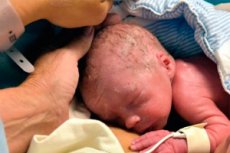New publications
A woman with a donor uterus was able to carry and deliver a baby
Last reviewed: 02.07.2025

All iLive content is medically reviewed or fact checked to ensure as much factual accuracy as possible.
We have strict sourcing guidelines and only link to reputable media sites, academic research institutions and, whenever possible, medically peer reviewed studies. Note that the numbers in parentheses ([1], [2], etc.) are clickable links to these studies.
If you feel that any of our content is inaccurate, out-of-date, or otherwise questionable, please select it and press Ctrl + Enter.

In Sweden, a unique case of the birth of a child occurred, who was born to a woman with a transplanted donor organ – a uterus.
The 36-year-old woman who took part in the experiment, despite some difficulties (premature birth, serious condition of the mother), was able to carry and give birth to a completely healthy baby.
The baby was born at 32 weeks weighing only 1800 kg, doctors discovered that he had a heart rhythm disorder, but today his condition has almost returned to normal, and both mother and baby are feeling well.
Problems with the uterus, the most important organ for childbearing, can arise not only as a result of congenital anomalies, but also after anti-cancer therapy. In this case, a woman's only chance to become a mother is a donor organ transplant.
The Swedish woman who took part in the research project was found to have no abnormalities in her ovaries, and underwent a cycle of in vitro fertilization (IVF), which resulted in the production of 11 embryos.
The next step was the transplantation of a donor organ, which was taken from a woman who had already gone through menopause several years ago. After the transplant operation, the Swedish woman took a course of drugs that prevent the rejection of a foreign organ. The decision to implant frozen embryos was made a year after the operation.
It should be noted that several attempts to transplant a donor uterus have been made previously, but in one case the organ had to be removed three months after the operation, as it ceased to function normally, and in another case the woman's pregnancy ended in a miscarriage.
Before the last attempt to transplant a donor organ, scientists conducted long-term (more than ten years) studies on animals, which, in their opinion, was the reason for the successful operation.
However, experts have warned that taking drugs that prevent the rejection of a foreign organ causes significant harm to health, so in the future it will be necessary to either remove the donor organ or carry a child again.
Another unique case was the implantation of a vagina in patients, which was grown from their own cells. The owners of such an organ were four young girls with a rare genetic anomaly, as a result of which the uterus and vagina remain underdeveloped. As the girls themselves note, five to eight years after the operation, they do not observe any problems with the organ, which functions quite normally. The girls also noted that they live a full sexual life.
The genetic disorder found in the study participants, Mayer-Rokitansky-Kuster-Hauser syndrome, occurs in approximately one woman in 4,000.
At the time of the transplant, the girls were between 13 and 18 years old. The implanted vagina was grown from the patients' own cells, which prevented organ rejection.
To create the perfect vagina, experts needed a sample of the patients' vulval tissue, which was then multiplied in the laboratory. After the tissue had reached the required size, doctors surgically created a cavity in the body, to which they connected part of the artificial vagina, the remaining part was connected to the uterus.
 [ 1 ]
[ 1 ]
